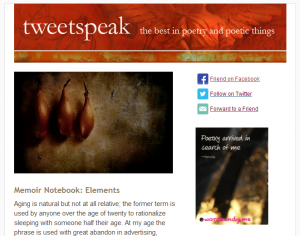Whenever we return to my hometown of New Orleans, we inevitably drive all over to see friends, visit the French Quarter, see my older brother, and hit the local grocery store for food items you can only buy in the region. Just as inevitably—and by necessity—we travel streets that pass right by my junior high and high schools. Those were the two places where my ideas and understanding of poets and poems formed and took root.
Teachers can have an enormous impact, for good and for ill. It was my good fortune to have invariably good literature and English teachers, from eighth grade through high school graduation. Most of these teachers were of the same generation—they had all been teaching for 10 to 15 years, except for one whose tenure was approaching 40 years.
With that one exception of the oldest teacher, my English teachers had all been strongly influenced by the Modernists, so it is no surprise that the writers we read were Hemingway, Fitzgerald, Faulkner, Theodore Dreiser and the writers who had immediately preceded them, the so-called Realists like Willa Cather, Jack London and Upton Sinclair. The poets we studied most intensively were also those associated with the same time period—Yeats, Eliot, the English poets of World War I, Sara Teasdale, Edwin Arlington Robinson, Edgar Lee Masters, William Carlos Williams and Robert Frost.
While my teachers shared influences, they didn’t have a uniform mind or approach to teaching; my junior English teacher believed Jacqueline Susann’s Valley of the Dolls (1966) would soon be recognized as one of America’s great works of literature (we’re still waiting). But because they had been influenced by the Modernists, so, by extension, were their students. Three of my favorite poets are still Dylan Thomas, Eliot, and Wallace Stevens.
My senior English teacher, the oldest of the group, proved to be something of an exception. Her first undergraduate degree had been in physics, and she would have gone on to a Ph.D. except she loved literature so much that she went back for a second B.A. degree, this one in English.
She was approaching her mid-60s, and she retired some three years after I graduated. She was diminutive, barely reaching five feet, and was always, always well dressed. She and her sister lived in the family home on the most exclusive street in our suburb; she did not work out of necessity but from passion for her subject.
She loved literature of all types—fiction, non-fiction and poetry. She required each of us to memorize and recite a soliloquy from Shakespeare, “because you aren’t educated unless you can recite one of his soliloquies.” I memorized the dagger speech from Macbeth. She led us in an inspired study of Don Quixote by Cervantes, and made allowances for the demands on the time of seniors by letting us read the abridged version. Two of us, including me, read the unabridged version, and we were likely the only two in the class who understood her love for the work.
She also read poetry aloud to us (we were a class of all boys), and had us read it aloud. I remember reading aloud a portion of Tennyson’s In Memoriam. She introduced us to Milton, Donne, Boswell and Johnson, Edmund Burke, George Eliot, and Thomas Hardy (the all-boy class discussion of The Return of the Native was memorable). And Wordsworth, Coleridge, Keats, Yeats, Eliot and Housman.
I internalized her love of English literature. In college, as a journalism major, I opted for two semesters of English literature instead of the standard courses taken by most sophomores. I studied with the English majors and found myself ever more enthralled with English poetry and literature.
And my love affair with literature continued. I can look back now and understand how literature and poetry grew into a significant part of my life, all because of good literature teachers in general and one teacher in particular.
Have you had influential teachers who helped shape you and your interest in writing, literature and poetry?
Image by basykes Sourced via Flickr. Post by Glynn Young, author of the novels Dancing Priest and A Light Shining.
___________________________
Subscribe to our free weekly newsletter.
We’ll make your Saturdays happy with a regular delivery of the best in poetry and poetic things.
Need a little convincing? Enjoy a free sample.
- “Your Accent! You Can’t Be from New Orleans!” - October 9, 2025
- Poets and Poems: Donna Vorreyer and “Unrivered” - October 7, 2025
- Poet Sidney Lanier and the Lost Cause - October 2, 2025

Maureen Doallas says
A wonderful testament to those who made words come alive for you.
Glynn says
Thanks, Maureen.
davis says
interesting to think of the part that people play in one another’s lives taking into consideration the past of the people and the of the place in a time when it was likely that many of the adults grew up and stayed in the same general area.
you were in contact with some rich and fully formed influences of character.
Glynn says
Thanks for reading the post, Nancy. Although I did have to wonder about “Valley of the Dolls.”
Diana Trautwein says
This is a lovely read, Glynn. I was blessed with several fine English lit teachers, one of whom stands out. And I found out that Mark Roberts, from the Laity Foundation, shared the same teacher, at the same school! He was intimidating, fiery, and brilliant. And he loved writing and words. He taught us how to write coherently and critically and I will be forever grateful for his impact on my later life.
Glynn says
Diana – it’s amazing the impact good teachers can have. My high school years were bookended by two extraordinary English teachers — good teachers can change lives. Thanks for the comment.